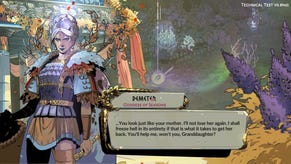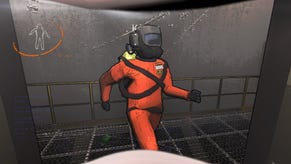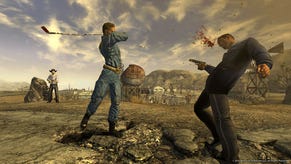Above And Beyond: Rediscovering Alpha Centauri
Beyond Beyond Earth?
As we prepare to cast judgement on Civilization: Beyond Earth, Firaxis' latest voyage into the unknown, we cast out minds back to Alpha Centauri's treatment of humanity's future. With a stronger emphasis on narrative, rigid factions and a malleable Planet, Alpha Centauri changed the Civ formula significantly and to great effect. We asked author and Icon deputy editor Will Wiles to examine the impact of future past.
Sid Meier's Alpha Centauri was always a sideways move for the seminal Civilization series of turn-based straegy games. But it was an entirely logical one. Every iteration of Civilization has had a successful mission to our nearest stellar neighbour as one of its possible paths to victory, with the intriguing suggestion that there, human history begins anew. You have taken your tribe from a single vulnerable settlement to planetary plenipotence - now your tribe will tell that story again under an alien sun. But is the story always the same?
The family resemblances with classic Civ are plain enough. Seven cultures, each starting with a single settlement, a darkness-shrouded world to explore. A small number of basic units and base facilities, which can be added to by climbing up a tech tree.. The Civ player can start off feeling right at home, making easy equivalences - the free-gift huts or ruins in the Civ games are replaced by supply pods, barbarians are replaced by ravening, sanity-assaulting, brain-eating mind worms … wait, that's less familiar. Where are the fruited plains of Civ? What's with the impenetrable, useless local fungus? And was that a green mind worm we just saw slithering through the puce undergrowth?
We're not at home. Alpha Centauri took the fundamentals of the Civ games – competition between empires, slow development of infrastructure, technological advancement along a tech tree to unlock new buildings, units and abilities – and gave it a few good, hard twists, resulting in a truly distinctive game. It was no spin-off, no reselling of an old experience in a new skin. Instead it was a fully realised success in its own right and even shows that the Civ games, for all their immense strengths, had areas that were under-explored or perhaps even poorly implemented. There were things that could be altered significantly while still succeeding.
Alpha Centauri did this partly by adding new factors – that alien world, its secrets and its unfamiliar, unfriendly locals. But it also thrived – and has endured – by restricting the player's options. In place of the famously open-ended potential of Civ was a more compact and thoughtful experience.
Take the factions, which are established in the opening moments of the game. Earth has suffered an unspecified but apparently many-Horsemanned apocalyptic breakdown, hinted at in snips of grainy, chaotic video. Our mission to Alpha Centauri is recast not so much as the pinnacle of human achievement but a last desperate throw of the dice. In the Centauri system there orbits a tempting, possibly habitable, planet with the plain name Planet (which seems at first glance to be a bit lazy, until you imagine a United Nations subcommittee pressured to come to a universally culturally acceptable name at the eleventh hour). But with Planet in sight, the commander is slain by an unknown assassin, the mission splinters and the ship breaks apart. Seven factions, each based around a vision for the new world, pilot their own chunk of wreckage to the surface and set about building their particular flavour of paradise.
A pleasure to be found in the original Civ games was the unexpected historical paths nations could take - you could find yourself competing against industrial-powerhouse Iroquois, social-democratic Huns, basket-case communist Americans. And you never knew who your neighbours would be at the start of the game. Alpha Centauri's factions do not vary. Each is devoted to a different set of values and priorities, embodied by its charismatic leader – the militarist Spartans, the tree-hugging Gaians, the authoritarian and communitarian Hive – and each has a convincing voice and manner. (It's a good game for female characters, too.) But it's only ever that seven and they don't stray far from their founding values. This is obviously more limited in some ways than the free-form nature of Civ factions, but it feels like the beginning of a conversation about the human qualities that will survive and thrive on an alien world, and it's a conversation that differs every time.
Another example. One of the less satisfactory aspects of the classic Civilization games has been their handling of terrain and climate. Terrain was never much more than a selection of different properties – movement penalties, food potential – painted onto a flat surface, and climate pretty much doesn't figure at all, a startling fact, given its influence over real human history. Still, it worked well enough for its purpose and often threw up interesting challenges during play, but it could have been so much more.
Alpha Centauri showed how to make it more, taking a very different approach to worldbuilding. Planet had a procedurally generated three-dimensional surface – its vales and mountains were not “terrain types” but naturally occurring features in this contoured isometric environment. Pretty much the only “terrain type” on Planet was a parched brown tundra, littered with rocky patches and one or two points of highly local specialism, such as the verdurous Monsoon Jungle and the radioactive acne of the Uranium Flats.
Variety was added to this barren land by the climate, which allowed some sparse greenery to grow on the windward side of ridges and near freshwater springs. These springs could support rivers, if the terrain allowed an uninterrupted flow of water down to the sea, so a wasteland of dust and stones had intermittent fertile oases capable of supporting clusters of settlements. But much more common was the native flora: Xenofungus, an ugly and ubiquitous pink weed, which in the early game is hard to traverse, useless for cultivation and a source of constant danger from those Cronenbergian swarms of worms.
Finding a niche in this hostile environment, and then steadily shaping and cultivating it into a fertile garden, was one of Alpha Centauri's central challenges – and central to its characteristic, enduring appeal. Forests could be seeded, and once established spread on their own, drawing more moisture to the surface. Rainfall could be artificially boosted using “condensors”, and “thermal boreholes” tore into the crust, releasing resources and energy. And the undulating terrain could be raised or lowered, and new freshwater springs dug, so dry valleys could be watered and dead-end streams could be coaxed into irrigating vast tracts. These techniques could also be turned to destructive ends, allowing devious environmental warfare unthinkable in classic Civ. A river that starts in your territory and flows into your rival's land can be diverted or dammed up entirely, wrecking their agriculture and starving their bases without a shot being fired.
The Earth-based Civs are characterised by an intoxicating sense of abundance in the early game, as you explore and uncover fruitful plains and plentiful untapped resources. Instead of this manifest-destiny fantasy, Alpha Centauri's early game has an atmosphere of hard frontier poverty beautifully in keeping with its storyline. You must work the land – and it will resist. Rather than being a passive theatre for your dreams of conquest, like the worlds of Civ, Planet was an active character, a dynamic, living, breathing entity that had to be studied and understood. One could say “it's almost an eighth faction”, but in truth it's more than that – more menacing than the other players in the early game, and more important than them in the later game.
The unvarying initial setup and the player's evolving interaction with Planet form the basis for Alpha Centauri's greatest strength, the secret of its overall success - its story. It is a tremendously well-written game. This applies to its incidental writing, such as the snippets of the faction leaders' works and diaries that appear as you advance through a plausible future-technology research tree, but also to its overall structure. This is what the restrictions of choice and the privations of Alpha Centauri add up to - a remarkable sense of atmosphere, and a journey of exploration and development that differs markedly from the classic experience.
The Civilization games naturally take their structure from human history; denied this well-worn arc, Alpha Centauri is a story about confronting, and then accepting, the Otherness of Planet. It is not Earth, nor will it ever be, and this will not be a replay of Earth's history. You can play the game clear-cutting, strip-mining and exterminating the indigenous life if you choose, but it is much more satisfying and rewarding to come to a more sophisticated relationship. As for your opponents, they are on the same journey, but if they get in your way, if talks should fail … well, you know what has to be done. This is Civilization, after all.













